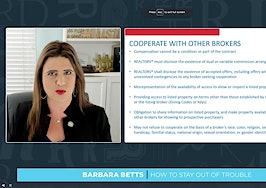Buyer’s agents often send a letter to listing agents along with a purchase offer where buyers extol the virtues of the home they’d like to buy and describe how the home will make a difference in their lives. But using these letters, whether you’re a buyer’s agent or a listing agent, could be a violation of the Realtor Code of Ethics.
That’s according to Barbara Betts, broker-owner of the Betts Realty Group and a director of the National Association of Realtors, the California Association of Realtors and the Pacific West Association of Realtors. Betts is also a hearing officer at her local Realtor association, which means she determines whether a Realtor did or did not violate the code of ethics and what discipline to impose if they did.
Betts spoke at the the Realtors Conference and Expo last week in a session called “How to Stay Out of Trouble: Risk Management and Code of Ethics.” She covered half a dozen articles in the code, including Article 10, which covers fair housing. She did not touch on the recent controversial changes to the code to crack down on racist and discriminatory speech and behavior, but specified four ways that agents violate Article 10, including through the use of “buyer love letters.”
Article 10 reads, in part: “Realtors shall not deny equal professional services to any person for reasons of race, color, religion, sex, handicap, familial status, national origin, sexual orientation, or gender identity. Realtors shall not be parties to any plan or agreement to discriminate against a person or persons on the basis of race, color, religion, sex, handicap, familial status, national origin, sexual orientation, or gender identity.”
Here are some of the examples Betts gave for ways agents commonly violate that article:
- Refusing to rent or sell to someone on the basis of any of the above characteristics. “You cannot say, ‘You can’t buy this house because you are ___’ [or] ‘You don’t fit into this neighborhood’ [or] ‘Are you sure you want to live here?’ You cannot do this and especially in the rental market now,” Betts said.
- Not giving the same information to everyone. Betts advised attendees to read Newsday‘s groundbreaking, three-year investigation that revealed widespread agent bias against consumers of color in the Long Island housing market. “What these Realtors were doing is when two different couples came in to visit with them they were giving different opinions and information about the neighborhood depending on what color they were. We cannot do that,” she said. “You can’t tell one couple the neighborhood is safe and the other couple the neighborhood is not safe. Or tell the other couple you shouldn’t buy here, but tell the couple of color that it’s okay to buy here or you don’t mention it at all. You have to give the same information to everyone.”
- Not having the same requirements of every buyer. “If you require a buyer to be cross-qualified with your lender, you better make it every buyer. Because one buyer can claim you’re requiring them to be cross-qualified because of something that they are and we cannot do that,” Betts said.
- Using buyer love letters, especially as a listing agent. “Sellers are humans. Even though they are not purposely trying to create a fair housing situation for themselves, they inadvertently are,” Betts said. “When the seller gets these letters, they get excited to sell the home to someone they feel will fit into their neighborhood and that’s where there’s a problem.”
For instance, a seller may want to sell their home to a family because the neighborhood is full of kids and therefore gives preference to a buyer that’s a family rather than a couple or a single person — that’s a violation of fair housing, she said.
Buyer offer letters often disclose the buyer’s familial status, religion or handicap status, just by saying, “I can see our family celebrating Christmas here” or “I finally found a home that can accommodate my wheelchair after months of looking,” according to Betts. Sometimes buyers even include a photo of themselves, which can reveal their race, color, familial status, sexual orientation or gender identity.
What if the seller mentions to a neighbor that they just sold their home to a family because they wanted kids in the neighborhood and the neighbor knows another couple that made an offer and tells the couple why their offer wasn’t accepted? “That other couple could easily file a fair housing lawsuit against the seller, even if the seller didn’t intend it to be that way,” Betts said.
Citing NAR’s general counsel, Katie Johnson, Betts said real estate licensees should avoid suggesting the use of these letters and definitely should not help clients write the letters.
“We need to consider raising fair housing concerns with our buyers. Don’t read or accept these letters that are drafted by a buyer. Certainly do not give any support or suggestions,” Betts said. “As listing agents, we definitely need to discuss the potential liability at the listing interview and not deliver or accept these for the seller.”
She recognized that buyer’s agents would likely be “very angry” with her advice, but said her job as a listing agent would be to protect her client. “When I explain this to my clients, to this day, I have not had one client say to me, ‘Well, I still want the letters.’ No, they are like, ‘Oh my God, you’re so right. I don’t want those letters,'” Betts said.
When that happens, Betts notes in the MLS that the seller will not accept or review offer letters. “If they do send me one,” she explains, “I have permission from the seller to respond back to the buyer’s agent and say, ‘Please remove this from your offer. The seller will not accept it.'”
If a seller decides to accept a love letter, Betts, quoting Johnson, said agents should consider having the seller and buyer’s attorney review the letter and keep a record showing good faith efforts to advise against this practice.
“This is very serious. I know you’ve seen lots of articles telling you to do this because it’s a way to get your offer accepted. But when it’s a way to get your offer accepted and violates fair housing laws, there’s a problem,” she said.
“Now if the letter is all about ‘I love your home. It’s beautiful. I love how you’ve remodeled it, I promise I won’t tear it down and remodel it.’ There’s not any fair housing violations in those statements. The second you start talking about family, color, race, religion, marital status, those things instantly become possible fair housing violations.”
Betts advised attendees to go to their broker and their state and ask how they should handle such situations.
“At the end of the day, the last place you want to be is a fair housing lawsuit. It’s very expensive,” she said.
On managing risks
Regarding managing ethics risks in general, not just in relation to fair housing, Betts advised attendees to document everything, including phone and text conversations, by summarizing them via email — especially if the conversation did not go well.
“I will hang up the phone and send an email and say ‘Mr. and Mrs. Seller, per our conversation, I want to make sure we’re both on the same page…’ I am documenting that conversation to ensure that what I intended them to hear they actually heard,” she said.
She also emphasized that it was important to give clients choices for things such as home warranties and home inspectors in case something goes wrong with the home.
“Do you as your practice actually send the home warranty sample contract to your buyer and say, ‘The seller has included XYZ plan. What upgrades do you want to add?'” Betts said.
She said she had a client who had a roof leak and asked if the home warranty would cover the leak and Betts said no, that she would have had to have added leak protection. “And she said to me, ‘When did I have the opportunity to add that?'”
Lastly, she advised agents to ask clients questions constantly to make sure they understand what the agent is saying.
“It’s the silent clients that don’t ever ask a question that you need to worry the most about. The silent ones who don’t ask questions typically don’t understand what you’re saying and they’re the ones that are going to sue you down the road because you didn’t ask them if they understood,” she said.













